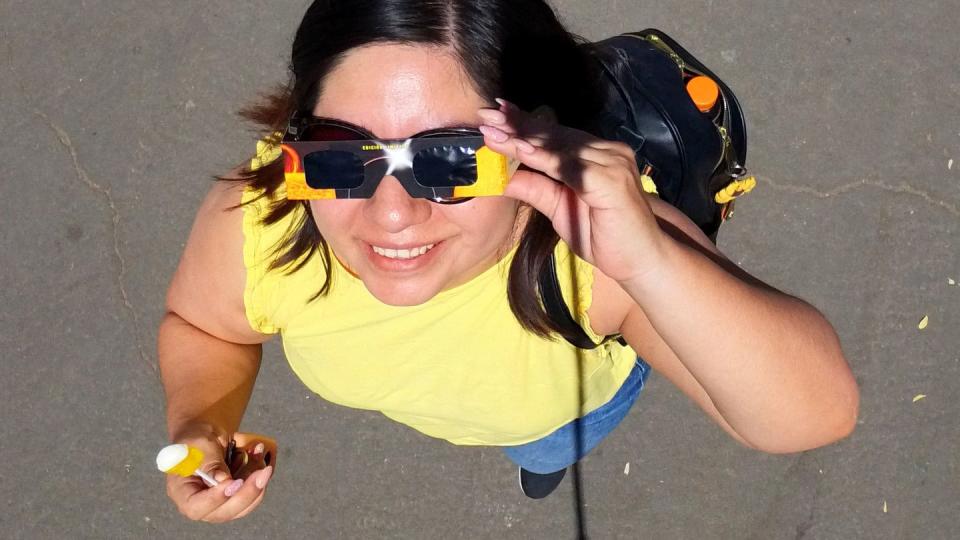The Eclipse Isn't Why You're Feeling 'Weird' Today, Say Health Experts

The solar eclipse was a huge deal in the U.S. yesterday, with people across the country stopping to check out the astronomical event as it happened in the middle of the afternoon. But some people also claimed that the event made them feel off, health-wise, in something that’s now being called “eclipse sickness.”
“Any of u also experiencing headache bc of the solar eclipse?” one person wrote on X, formerly Twitter. “Honestly same. I just realized 😭 it's sooo bad and painkillers won't even work omg,” another said in the comments.
“This just has me wiped out, feeling weird,” someone else wrote on X. People even linked weird menstrual cycles to the eclipse. “Did anyone else get their period today?” a concerned person wrote. “I’m 2 weeks early and have only had an irregular cycle like 4 times in my life. #Eclipse.”
Overall, people have linked headaches, nausea, irregular periods, and a slew of other side effects to the eclipse. But is eclipse sickness for real? Doctors say nope.
"True illness from experiencing the eclipse is unlikely," says Nicholas E. Kman, MD, an emergency medicine physician at The Ohio State University Wexner Medical Center. "It’s possible that the body might be affected by travel, anticipation, or adrenaline from the experience, but true illness is probably unrelated."
“There is no data or reason to think that this would be real,” adds Lewis Nelson, MD, chair of emergency medicine at Rutgers New Jersey Medical School. “The eclipse involves same sun and moon that you see every day—they just happen to align in a very specific way.”
Nelson says that symptoms of eclipse sickness are probably due to “pre-conceived ideas of what might happen during an eclipse.”
Women’s health expert Jennifer Wider, MD, agrees. “There is no scientific evidence for ‘eclipse sickness,’” she says, adding that this is largely “superstition, mixed with a bit of hypochondria.”
As for the wonky period claims, this is “not rooted in science,” says Christine Greves, MD, a board-certified ob/gyn at the Winnie Palmer Hospital for Women and Babies. “If changes in the menstrual cycles are not normal for you, make sure you’re not pregnant and contact your ob/gyn if you have concerns,” she says.
What can come out of the eclipse, though, is the possibility of vision damage if you stared at the sun without wearing proper eye protection. The eclipse can cause something known as solar retinopathy, which is essentially a sunburn on your retina, the light-sensitive layer of tissue at the back of the eyeball, says Bavand Youssefzadeh, D.O., an ophthalmologist at Global Lasik and Cateract Institute in Huntington Beach, CA. Symptoms of that include watery eyes, headaches, sensitivity to light, blurred vision, eye pain, and blind spots, according to the Cleveland Clinic. “It can leave permanent damage,” Youssefzadeh says.
If you started feeling off when the eclipse happened, Nelson recommends remembering that things can still happen to you during the astrological event—it’s just highly likely that your symptoms are unrelated to what was happening in the sky.
“I’m sure that when the moon and sun aligned, somebody had a heart attack,” he says. “But it wasn’t because of the eclipse. Somebody just happened to have a heart attack.”
You Might Also Like

 Yahoo Sports
Yahoo Sports 
